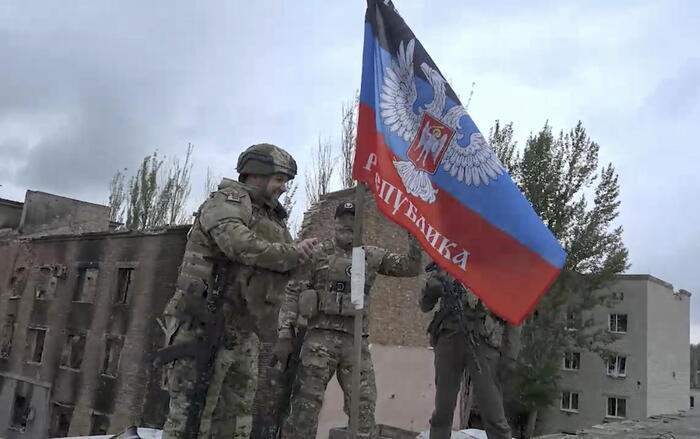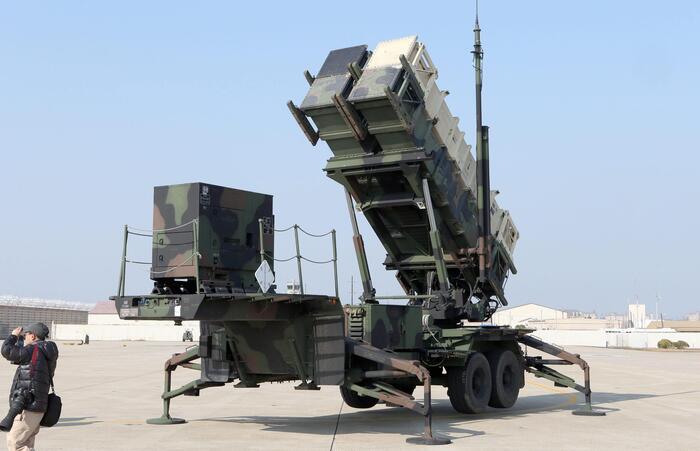The drone of the drones that navigate through the leaden gray sky of Kupiansk, in the northeast of Ukraine, sows restlessness and doubts.
Sometimes someone stops over the heads of the two volunteers on a humanitarian mission who arrived from the city of Kharkov, accompanied by the special envoy from EL PAÍS.
Impossible to know if those metal birds are Russian or Ukrainian.
Doubts arise about whether to get out of the way, but immediately both continue with their mission.
At one point, when they try to rescue two dogs left behind by a runaway family, inside a house, the noise of several bursts of gunshots prevails in the air.
For a few seconds they break the silence of the ghostly streets, dotted in some areas with destruction and remains of the stampede of the Kremlin troops, who set foot in dust four days ago.
More information
Follow live the last hour of the war in Ukraine
The vertical monolith with the word Kupiansk that marks the arrival on the road is still painted blue, white and red, the colors of the Russian flag.
Several Ukrainian soldiers with their vehicles occupy what until recently was an enemy checkpoint.
The town is about thirty kilometers from the border with Russia, it is one of the places won in the counteroffensive launched by the Ukrainian army in the Kharkov region since September 6.
According to the authorities, in this region alone they have liberated some 8,000 square kilometers from the presence of invading troops, the equivalent of the Community of Madrid.
But the bangs of the Ukrainian artillery in the surroundings of the Oskil River, which divides Kupiansk, resound every so often this Wednesday during the hours that the visit lasts.
The announced release affects only the west bank, residents say.
The eastern bank remains in dispute.
A missile remains stuck in front of an apartment building in Kupiansk.
LOUIS DE VEGA
In the midst of the fear that overwhelms the population in the face of a possible return of the Russians, Taras, 31, returns home by surprise after more than 200 days absent.
He does it to the cry of “hände hoch!”
wearing bulletproof vest and helmet.
This is the German expression "hands up!", which in Ukraine is kept as a joke heritage of World War II.
He seemed like the best idea after half a year without seeing his family.
He chose that entry into the house in a movie plan despite the fact that everyone is still shaken.
The grandmother, the mother, the father, the brother, the neighbors... everyone, like an advertisement for nougat, merges in a few seconds of hugs, joy and tears of joyful welcome around the prodigal son, whom the war has kept away since the invasion began on February 24.
The mother, Helen, 52, without launching even half a criticism of Moscow, does not deviate from a position that could be described as neutral in the conflict when asked about what it has been like to live under Russian domination.
“The last six months everything was normal.
On September 1, the children went to school.
There were no shots.
Then all the bombing started.
Now we have spent seven days in the basement.
The stores worked.
The Russians didn't touch us.
Until they turned on each other, everything was fine.
People don't care, just don't shoot.
People are scared and want peace”, she points out in front of relatives, neighbors and her own son.
Her position is not an isolated case in an area of Ukraine with close ties to neighboring Russia and where residents sometimes do not interpret reality in the same way as the kyiv authorities.
In any case, the encounter with Taras is fleeting.
Just five minutes of physical contact and leave some medicines.
Taras is one of those two volunteers who from the beginning of the invasion tries to help recover the pulse of his city.
Like him, hundreds of thousands of Ukrainians were carried away by the wave of altruism and solidarity that continues to engulf the country.
They fight without being military from a second front line in all kinds of tasks.
Taras, who before the war worked for a British businessman who eventually left, accompanies his friend Anton, 26.
Both travel in a black SUV covered in mud and with the national flag covering the rear window.
They raise their fists as they pass tanks loaded with soldiers and come and go from the front.
The uniformed men respond by also raising their arms in the midst of an atmosphere of euphoria for the ground gained these days.
The two volunteers carry the trunk full of bags with food, water, cigarettes, diapers, medicine... On the mobile, the addresses of people who know they need help.
They bang on the gates of the houses and shout from the street towards the apartments.
In some cases they get an answer, in others, nothing.
Kupiansk is still without electricity, without water and with hardly any citizens.
In between, they also go to the hospital to bring help.
At the entrance lie two khaki green canvas stretchers smeared with dried blood.
Anton and Taras know the streets well and move with ease with little time to stop at the damage and destruction.
They have been vaccinated throughout this war for the scenario they have encountered in their own city.
These two are the first arrivals from outside that some of the neighbors see since the Russians left on Saturday.
Emotion overwhelms Ludmila, 81, who lives alone in an apartment next to the fire station.
She is one of the old women they bring food to.
She, however, forces Anton and Taras to accept a bunch of grapes.
The woman, in tears, also hugs the reporter.
“You are like my grandson”, she affirms without wanting the small expedition to continue on its way.
Loneliness is another of the burdens in these towns that have been occupied for more than six months.
Accustomed in all this time, the rumble of the detonations do not alter the woman or the few neighbors in the area.
Nor the two volunteers.
Volunteer Anton delivers a bag of food to 81-year-old Ludmila, who lives alone in her apartment in Kupiansk.
LOUIS DE VEGA
In another apartment block also from the Soviet era in Kupiansk, which before the invasion had about 30,000 inhabitants, a neighbor says goodbye to one of the two little dogs that Anton and Taras take to Kharkov, the second largest city in the country.
Some soldiers saved them from an apartment by breaking down the door after their owners could not take them in a hasty escape.
Victoria, an activist who lives with 26 cats and several dogs, helps them into the car.
Some of them look for the light from the gallery terrace of an apartment that is almost dark and enveloped in a strong smell.
In the midst of coming and going from one point to another in the city, Anton takes the opportunity for a few minutes to retrieve the photo albums from his parents' house, in a building that has several impacts on the façade and the side.
As evening falls, when starting the return, next to the hard shoulder, the monolith that welcomes us has already been repainted and shines with the yellow and blue of the Ukrainian standard.
“Kupiansk has been the capital of Russia's Kharkov banana republic for six months,” one young man jokes.
Follow all the international information on
and
, or in
our weekly newsletter
.
Subscribe to continue reading
read without limits
Keep reading
I'm already a subscriber

/cloudfront-eu-central-1.images.arcpublishing.com/prisa/I2PUB273ENHWNOSNFH75HMBBYY.JPG)












